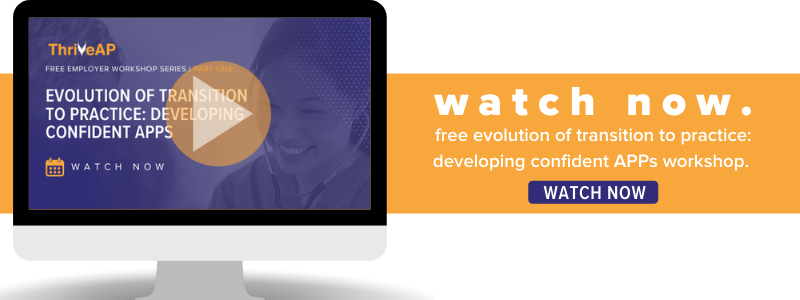
Transition to practice (TTP) is the crucial time in which NPs/PAs develop skills, competencies and practical knowledge necessary to optimally perform their roles/responsibilities. Transition to practice aims to create a skills bridge to accelerate the provider from clinical competency to clinical confidence.
Post-graduate practicing providers, NPs re-entering the workforce after an absence, providers changing specialties, and providers who have been in practice for an elongated period (10 years or more), would all benefit from evidence-based support. This where a transition to practice program, or NP fellowship, can play an instrumental role for providers and their employers.
What is a Transition to Practice Program?
A transition to practice program is a 12-month, evidence-based, curriculum focused on common diagnoses, real-world skills, professional development and trending topics happening in the world of healthcare. Providers are mentored on patient interactions, finding solutions, and supporting patients for better outcomes, while developing professionally and clinically.
The goal of a successful TTP program is for the provider to:
- Develop comfort and confidence in practicing autonomously, at an expedited rate
- Feel prepared for traditional primary care practice
- Overcome the learning curve newer providers often face early in their career, or refresh core skills for those who have been in practice for a longer period
- Increase skill mastery in a supportive setting conducive to learning
- Increase career satisfaction and performance
Sometimes referred to as an NP fellowship, this additional practical support excels clinical knowledge to help APPs become more autonomous in practice, improve organizational performance, and enhance patient outcomes.
What Does this Mean for Employers?
In 2010 and again in 2015, The National Academy of Medicine (NAM), formerly known as the Institute of Medicine, called for transition to practice programs for APPs in response to the primary care physician shortage, increased complexity of patient care, and projected rise in APPs. NAM reported the need for nurse education to, “better prepare them to deliver patient-centered, equitable, safe, high-quality health care services; engage with physicians and other healthcare professionals to deliver efficient and effective care; and assume leadership roles in the redesign of the health care system.”
Since then, the healthcare industry challenges have compounded and are constantly evolving, making the role employers play in recruitment, retention, and onboarding of APPs, to name a few, even more complex (and costly).
With a TTP program employers benefit from providers excelling quicker, more confidently, more autonomously, and overall being more satisfied in their career. This leads to decreased talent acquisition costs, decrease in turnover costs and increased retention for employers. Additionally, these programs have proven through multiple research studies to increase productivity, organizational performance, and revenue.
What Employers Should Look for in a Transition to Practice Program
- Board certified instructors with 5-10 years of experience
- Speakers who are content experts with speaking experience, and currently practicing in their field of expertise
- Robust, relevant curriculum with topics aimed to onboard providers quickly and more proficiently
- Mentorship and support above the core curriculum
- Scalable programs made to integrate seamlessly within busy schedules, not disrupt them
- Accredited programs
- User friendly Learning Management System that can accommodate employers and participants
- Consistently updated content that evolves with the industry and what is mostly commonly seen in practice
Why ThriveAP is the Transition to Practice Educational Solution You Need
Employers and healthcare systems today can leverage the ThriveAP program as an enhanced educational tool to be a part of their transition to practice program and scale with their needs. The virtual curriculum is designed for participation that can fit within providers’ schedules seamlessly. Allowing employers to help APPs build foundational skills while balancing the demands of their evolving career, and alleviating burden from the collaborating team.
Participants learn from seasoned instructors who are active experts in their field of practice. The ThriveAP TTP curriculum goes beyond evidence-based medicine through our accredited, relevant curriculum of 46 weekly, live virtual sessions.
Our program helps facilitate application of what providers learned in school to real world clinical practice, benefiting APPs and their employers.






Leave a Comment
Your email address will not be published. Required fields are marked *